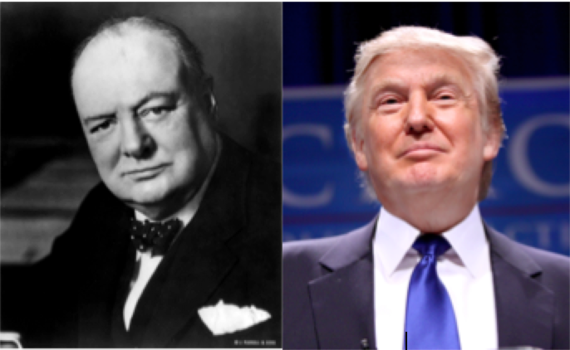
Economist and former UKIP leadership hopeful Professor Tim Congdon revisits Churchill’s legacy on Europe as Nigel Farage pleads with Donald Trump to have the former PM’s bust moved around the White House one more time
After being the first European politician to be granted an audience with President-elect Donald Trump, Nigel Farage made a striking suggestion. He said that the bust of Churchill moved by President Obama (there were two) should be returned to the Oval Office. It seems that Trump reacted very positively, although not making a definite commitment.
The future US relationship with Europe (and NATO) now comes under special scrutiny. Indeed, it was the subject of an ‘emergency’ EU summit meeting over the weekend. Even if the meeting was boycotted by Foreign Secretary Boris Johnson and the French foreign minister declined to attend citing a diary ‘clash’, this is a time to pause for reflection and to remember the lessons of history.
Winston Churchill was the greatest historian of the English-speaking peoples, by which he of course meant above all the people of Britain and the USA. What did he really have in mind when he advocated ‘a kind of United States of Europe’ in his Zurich speech of 19 September 1946? Would he be the champion of the EU project today as some – including his Europhile grandson, Sir Nicholas Soames – would have us believe? I don’t think so.
True, Churchill even prefaced his remarks by saying that he knew the idea of a pan-European alliance would ‘astonish’ his listeners. Specifically, ‘The first step in the re-creation of the European family must be a partnership between France and Germany.’ It is on the basis of the Zurich speech that Churchill is regarded by the European Commission as one of the founding fathers of the European Union.
But Churchill also emphasized in that speech that he did not see Britain as part of the United States of Europe. In his words, ‘there is already a natural grouping in the Western Hemisphere. We British have our own Commonwealth of Nations.’ In November 1951, after the Conservatives’ return to power following the second general election of that year, Churchill was again Prime Minister. Jean Monnet, even more definitely an EU founding father than Churchill, visited him to persuade him that Britain should participate in European integration. Monnet’s goals were ambitious, to forge a United States of Europe with one European army and defence force so that war between Europe’s nations could never return.
Their discussion continued late into the night and was evidently cordial. But Churchill was not persuaded. Churchill wrote a note for the Cabinet in which he clarified that ‘he had never thought that Britain should become part of a European Federation’. According to Jock Colville, who had been his secretary during the Second World War, in Churchill’s eyes Britain’s ‘true destiny’ was ‘the moral leadership of the English-speaking peoples’.
Monnet made no secret, then or later, that he envisaged a European federation in which national parliaments would be subordinate to a bureaucratically-run authority that was to evolve into a full-scale federal government. In the establishment of the European Community for Steel and Coal Community in 1952 he defended the supranational power of the proposed ‘High Authority’ over the community. He insisted there could be no national veto and no majority voting.
Churchill was dismayed by Monnet’s suggestions. He loved parliamentary democracy and believed in the defence of British sovereignty. In the subsequent 65 years the ECSC has evolved into the European Economic Community and then the European Union, while Britain has joined the EU, and ‘our own’ Commonwealth has lost geopolitical substance and meaning. Power in Europe has shifted on a massive scale from national parliaments to the EU’s supranational and bureaucratically-run High Authority now in the form of the European Commission. The elite Franco-German bureaucracy has been the driver of European integration by the stealth method envisaged by Jean Monnet, of incremental steps, with no public announcement and outside the headlines, and regardless of democratic consent at the national level.
But the EU’s member states remain sovereign in two key respects. They have not surrendered to EU institutions the right to raise taxes or to spend money, and they still do have undoubtedly national chains of command in their armed forces. If the British had voted to remain the EU on 23 June, two forecasts could have been made with some confidence. The first is that the EU bureaucracy would have urged that EU institutions be given the power to raise taxes and to spend money. This was already foreshadowed in the Five Presidents’ report for the Eurozone, published last year. Sure enough, that report was superficially intended to be a prescription only for the Eurozone, but it is likely that an attempt would have been made to trap Britain inside the federal structure.
Secondly, the European Commission would again have urged the merits of a European defence force, just as Monnet did in his talks with Churchill in late 1951. The Commission’s eventual aim, like that of many people in influential positions in German, French and Italian politics, is to end the separate existence of national armies, navies and air forces. If the UK had remained in the EU, that would have meant the disappearance, over time, of the British Army, the Royal Navy and the Royal Air Force.
By leaving the EU, Britain will be able to maintain both an independent voice in the world, and to defend the open world order that it built up with the USA in the closing phases of the Second World War and subsequently. Let it be noted that Churchill had his occasional gripes with President Roosevelt. But he never doubted the overriding importance to Britain of close ties with the US President to promote friendship between nations, and international trade and economic cooperation.
Tim Congdon CBE was runner-up in the 2010 UK Independence Party leadership election, and UKIP economics spokesman from 2010 to 2014.






